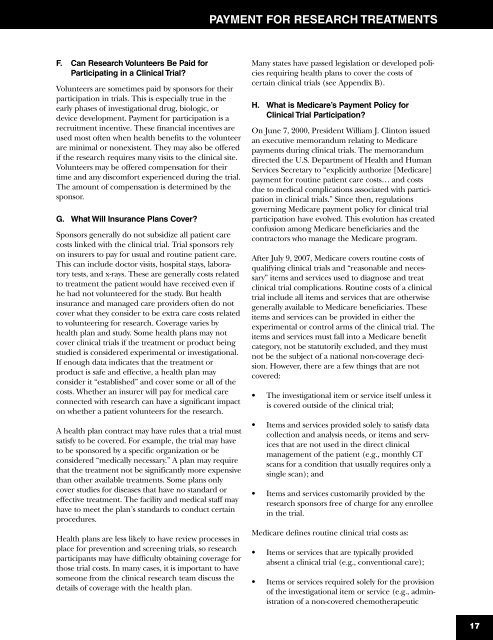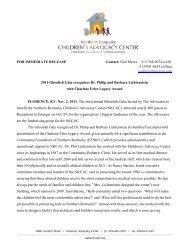Medical Research: A Consumer's Guide for Participation
Medical Research: A Consumer's Guide for Participation
Medical Research: A Consumer's Guide for Participation
Create successful ePaper yourself
Turn your PDF publications into a flip-book with our unique Google optimized e-Paper software.
PAYMENT FOR RESEARCH TREATMENTS<br />
F. Can <strong>Research</strong> Volunteers Be Paid <strong>for</strong><br />
Participating in a Clinical Trial?<br />
Volunteers are sometimes paid by sponsors <strong>for</strong> their<br />
participation in trials. This is especially true in the<br />
early phases of investigational drug, biologic, or<br />
device development. Payment <strong>for</strong> participation is a<br />
recruitment incentive. These financial incentives are<br />
used most often when health benefits to the volunteer<br />
are minimal or nonexistent. They may also be offered<br />
if the research requires many visits to the clinical site.<br />
Volunteers may be offered compensation <strong>for</strong> their<br />
time and any discom<strong>for</strong>t experienced during the trial.<br />
The amount of compensation is determined by the<br />
sponsor.<br />
G. What Will Insurance Plans Cover?<br />
Sponsors generally do not subsidize all patient care<br />
costs linked with the clinical trial. Trial sponsors rely<br />
on insurers to pay <strong>for</strong> usual and routine patient care.<br />
This can include doctor visits, hospital stays, laboratory<br />
tests, and x-rays. These are generally costs related<br />
to treatment the patient would have received even if<br />
he had not volunteered <strong>for</strong> the study. But health<br />
insurance and managed care providers often do not<br />
cover what they consider to be extra care costs related<br />
to volunteering <strong>for</strong> research. Coverage varies by<br />
health plan and study. Some health plans may not<br />
cover clinical trials if the treatment or product being<br />
studied is considered experimental or investigational.<br />
If enough data indicates that the treatment or<br />
product is safe and effective, a health plan may<br />
consider it “established” and cover some or all of the<br />
costs. Whether an insurer will pay <strong>for</strong> medical care<br />
connected with research can have a significant impact<br />
on whether a patient volunteers <strong>for</strong> the research.<br />
A health plan contract may have rules that a trial must<br />
satisfy to be covered. For example, the trial may have<br />
to be sponsored by a specific organization or be<br />
considered “medically necessary.” A plan may require<br />
that the treatment not be significantly more expensive<br />
than other available treatments. Some plans only<br />
cover studies <strong>for</strong> diseases that have no standard or<br />
effective treatment. The facility and medical staff may<br />
have to meet the plan’s standards to conduct certain<br />
procedures.<br />
Health plans are less likely to have review processes in<br />
place <strong>for</strong> prevention and screening trials, so research<br />
participants may have difficulty obtaining coverage <strong>for</strong><br />
those trial costs. In many cases, it is important to have<br />
someone from the clinical research team discuss the<br />
details of coverage with the health plan.<br />
Many states have passed legislation or developed policies<br />
requiring health plans to cover the costs of<br />
certain clinical trials (see Appendix B).<br />
H. What is Medicare’s Payment Policy <strong>for</strong><br />
Clinical Trial <strong>Participation</strong>?<br />
On June 7, 2000, President William J. Clinton issued<br />
an executive memorandum relating to Medicare<br />
payments during clinical trials. The memorandum<br />
directed the U.S. Department of Health and Human<br />
Services Secretary to “explicitly authorize [Medicare]<br />
payment <strong>for</strong> routine patient care costs… and costs<br />
due to medical complications associated with participation<br />
in clinical trials.” Since then, regulations<br />
governing Medicare payment policy <strong>for</strong> clinical trial<br />
participation have evolved. This evolution has created<br />
confusion among Medicare beneficiaries and the<br />
contractors who manage the Medicare program.<br />
After July 9, 2007, Medicare covers routine costs of<br />
qualifying clinical trials and “reasonable and necessary”<br />
items and services used to diagnose and treat<br />
clinical trial complications. Routine costs of a clinical<br />
trial include all items and services that are otherwise<br />
generally available to Medicare beneficiaries. These<br />
items and services can be provided in either the<br />
experimental or control arms of the clinical trial. The<br />
items and services must fall into a Medicare benefit<br />
category, not be statutorily excluded, and they must<br />
not be the subject of a national non-coverage decision.<br />
However, there are a few things that are not<br />
covered:<br />
• The investigational item or service itself unless it<br />
is covered outside of the clinical trial;<br />
• Items and services provided solely to satisfy data<br />
collection and analysis needs, or items and services<br />
that are not used in the direct clinical<br />
management of the patient (e.g., monthly CT<br />
scans <strong>for</strong> a condition that usually requires only a<br />
single scan); and<br />
• Items and services customarily provided by the<br />
research sponsors free of charge <strong>for</strong> any enrollee<br />
in the trial.<br />
Medicare defines routine clinical trial costs as:<br />
• Items or services that are typically provided<br />
absent a clinical trial (e.g., conventional care);<br />
• Items or services required solely <strong>for</strong> the provision<br />
of the investigational item or service (e.g., administration<br />
of a non-covered chemotherapeutic<br />
17
















